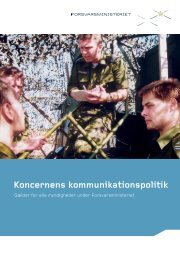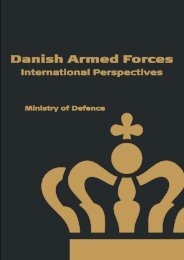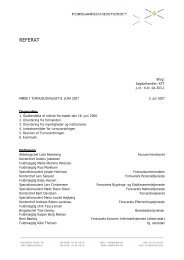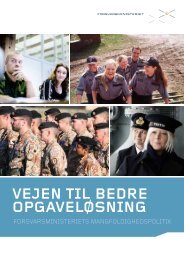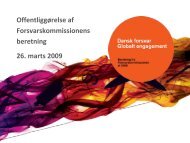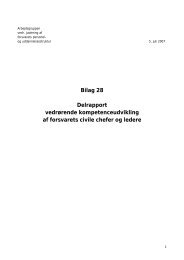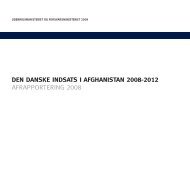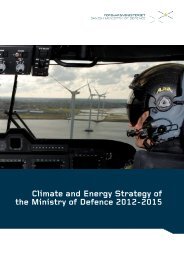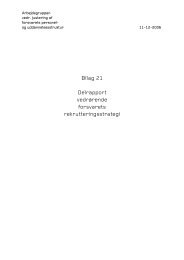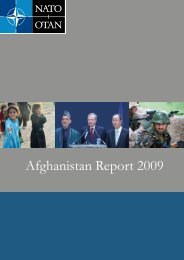the danish veterans' policy
the danish veterans' policy
the danish veterans' policy
- No tags were found...
You also want an ePaper? Increase the reach of your titles
YUMPU automatically turns print PDFs into web optimized ePapers that Google loves.
What has already been done?The Defence has carried out a series of initiativeswith substantial impact on <strong>the</strong> area.An overview of initiatives for recognition andsupport can be found on <strong>the</strong> homepage of<strong>the</strong> Ministry of Defence www.fmn.dk.An important part of <strong>the</strong> support for <strong>the</strong> relatives is briefingsregarding <strong>the</strong> mission, which <strong>the</strong> soldier is to bedeployed to, and regarding <strong>the</strong> options for support offeredto <strong>the</strong> relatives. These briefings are carried out in connectionwith meetings for <strong>the</strong> relatives, both before and duringdeployment. This is where <strong>the</strong> relatives are informed of <strong>the</strong>current mission, and any issues <strong>the</strong> relatives should beaware of. The relatives meet with <strong>the</strong> contact officer, and<strong>the</strong>y are briefed about typical emotional reactions, optionsfor support, family networks, and contact options in connectionwith any need for support.The children of deployed personnel may be heavily affectedby <strong>the</strong> deployment, and by <strong>the</strong> worries and altered reactionsof <strong>the</strong> partner left behind. Therefore, <strong>the</strong> childrenmay need special support. The effort to support <strong>the</strong>children, including <strong>the</strong> effect of <strong>the</strong> established supportgroups for children, must be examined. Therefore, <strong>the</strong>following initiative is taken:The effect of <strong>the</strong> deployment on partner and childrenwill be examined with a view to a possible increase in<strong>the</strong> support for <strong>the</strong> relatives.The Government streng<strong>the</strong>ns knowledgeand preventionIn order to continuously be able to target and optimize<strong>the</strong> effort in <strong>the</strong> veterans’ area, it must be fur<strong>the</strong>r developedon <strong>the</strong> basis of exact knowledge from scientific andsystematic follow-up on <strong>the</strong> experience of <strong>the</strong> Defenceand international research. Therefore, <strong>the</strong> followinginitiative is taken:A permanent knowledge centre is established. Knowledgeregarding veterans’ conditions must be put to usefor, among o<strong>the</strong>r things, <strong>the</strong> prevention of damage, <strong>the</strong>evaluation and development of focus areas, and <strong>the</strong>cooperation with external research institutions. Thus,<strong>the</strong> effort for veterans and <strong>the</strong>ir relatives is carried outon an increasingly qualified basis.The Government increases <strong>the</strong> follow-up effortThe Defence carries out a homecoming project for veteransfrom Afghanistan. In <strong>the</strong> project, called ‘Acclimati zationand Reintegration’, <strong>the</strong> unit is kept toge<strong>the</strong>r for athree months’ period of time after homecoming. In thisway, <strong>the</strong> veterans get <strong>the</strong> possibility of dealing with <strong>the</strong>experiences toge<strong>the</strong>r. At <strong>the</strong> same time, <strong>the</strong> veteransget used to <strong>the</strong> transition to civilian life. The veterans alsoget <strong>the</strong> possibility to identify <strong>the</strong>ir competences, and arethus prepared to apply for a civilian job, an educationor a position in <strong>the</strong> Defence.In order to counter any emotional reactions, <strong>the</strong> Defencehas initiated a series of o<strong>the</strong>r follow-up initiatives insupport of returned veterans.For instance, veterans from tough missions must attendan interview with a psychologist upon homecoming inorder to determine whe<strong>the</strong>r <strong>the</strong>re is a need for support.After homecoming, <strong>the</strong> Defence carries out homecomingmeetings for <strong>the</strong> formerly deployed units. Here, <strong>the</strong> soldiershave <strong>the</strong> possibility to meet old buddies and talkabout <strong>the</strong>ir experiences. At <strong>the</strong> same time, <strong>the</strong> Defenceis able to follow up on any emotional reactions with <strong>the</strong>veterans.Six months after <strong>the</strong> end of a mission, <strong>the</strong> veteranreceives a questionnaire, requesting replies to <strong>the</strong>veteran’s experiences and reactions after homecoming.The psychologists of <strong>the</strong> Defence address those veterans,whose replies indicate signs of need for support.No citizens are being forced to receive psychologicalor psychiatric help. However, emotionally traumatizedveterans must be contacted to a greater extent thanbefore and be offered help. Therefore, <strong>the</strong> followinginitiatives are taken:There will be an active follow-up on veterans, whoseemployment with <strong>the</strong> defence has ended. The aim isto keep in contact with veterans within <strong>the</strong> first yearsafter <strong>the</strong>ir transition to civilian life.The Defence will streng<strong>the</strong>n selected veterans’ abilityto render buddy support. The framework for buddysupport are clearly defined, and in such a way thatsocial and medical personnel of <strong>the</strong> Defence will beinvolved whenever needed.The veterans’ <strong>policy</strong> of <strong>the</strong> Danish government 19



